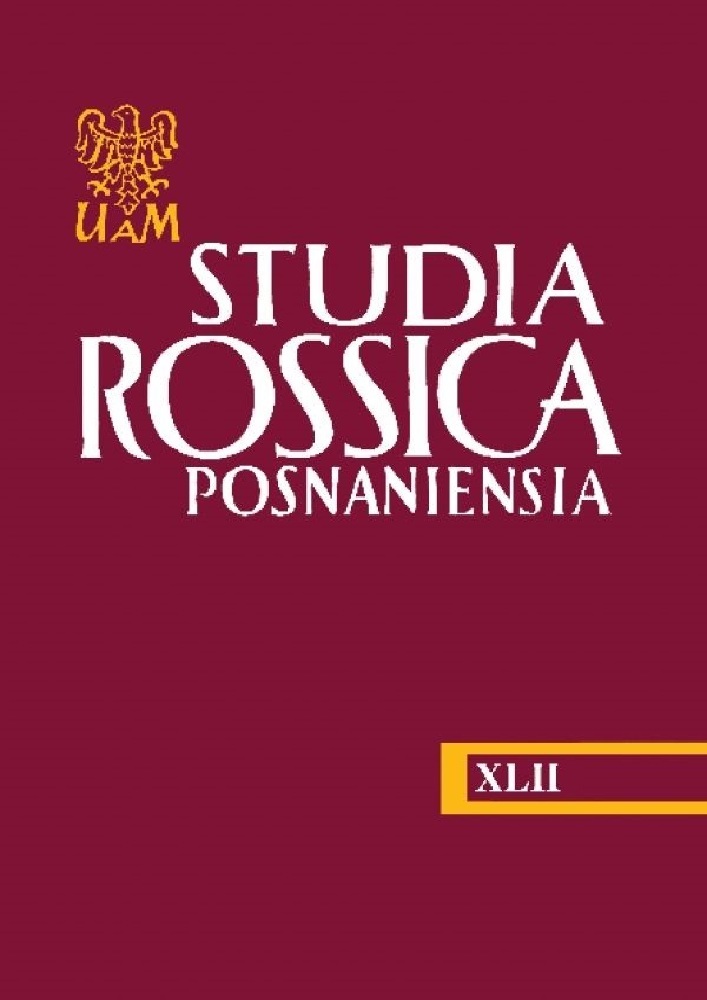Abstrakt
This study is an attempt to show how the “gender” semantics of fixed expressions form and what the function of the gender component is in this process. An analysis of the language material shows that there are several cases of modification of “gender” semantics of idiomatic phrases: changes in the phrase’s connotation (there are distinctions between utterances with the same structure in one language or between similar cases in different languages); the change of the referent from male to female (or vice versa) or to the common human meaning etc. It is also shown that the role of the gender component is intrinsic to semantic processes.Bibliografia
Bartmiński J., Podstawy lingwistycznych badań nad stereotypem — na przykładzie stereotypu matki, „Język a Kultura”, Wrocław 1998, t. 12, c. 63–83.
Bobrow S. A., Bell S. M., On catching on to idiomatic expressions, „Memory and Cognition” 1973, no. 1, c. 343–346.
Cutting J. C., Bock K., That’s the way the cookie bounces: Syntactic and semantic components of experimentally elicited idiom blends, „Memory and Cognition” 1997, no. 25 (1), c. 57–71.
Čermák F., Lexikon a sémantika, Praha 2010.
Čermák F., Úvod: Idiomatika a frazeologie ve vztahu k jiným disciplínám, [в:] Frazeologie a idiomatika česká a obecná, Praha 2007a, с. 13–22.
Čermák F., Základy a zásady frazeologie a idiomatiky, V: Frazeologie a idiomatika česká a obecná, Praha 2007b, c. 23–72.
Čmejrková S., Rod v jazyce a komunikaci. Specifika češtiny, „Slovo a slovesnost” 2002, roč. 63, c. 263–286.
Gibbs R. W., Spilling the beans on understanding and memory for idioms in context, „Memory and Cognition” 1980, no. 8, c. 149–156.
Lakoff G., Women, Fire and Dangerous Things, Chicago 1987.
Lakoff G., Johnson M., Metaphors We Live By, Chicago 1980.
Lewicki A. M., Rola motywacji w opisowym słowniku zwrotów idiomatycznych, [в:] H. Rybicka - Nowacka, B. Rocławski (eds.), Tradycja i nowoczesność w nauczaniu cudzoziemców języka polskiego, Wydawnictwo Uniwersiteckie, Gdańsk 1990, c. 64–73.
Pajdzińska A., Antropocentryzm frazeologii potocznej,
Etnolingwistyka” 1990, t. 3, c. 59–69.
Pajdzińska A., O znaczeniu związku frazeologicznego (raz jeszcze), „Problemy Frazeologii Europejskiej” 2001, t. 4, c. 11–18.
Sprenger S. A., Levelt W. J. M., Kempen G., Lexical access during the production of idiomatic phrases, “Journal of Memory and Language” 2006, no. 54, c. 161–184.
Swinney D. A., Cutler A., The access and processing of idiomatic expressions, “Journal of Verbal Learning and Verbal Behavior” 1979, no. 18, c. 523–534.
Авалиани Ю. Ю., К семантическим связям слов в самостоятельной функции и в составе фразеологической единицы, [в:] Вопросы описания лексико-семантической системы языка, Москва 1971, с. 15–20.
Алефиренко Н. Ф., Фразеологическое значение в системе семантических единиц других уровней языка, [в:] Теоретические проблемы семантики и ее отражения в одноязычных словарях, Кишинев 1982, с. 176–180.
Алехина А. И., Фразеологическая единица и слово, [в:] К исследованию фразеологической системы, Минск 1979.
Коваль В. И., Язык и текст в аспекте гендерной лингвистики, Гомель 2007.
Лепешаў І. Я., Упоравень з часам, Гродна 2010.
Мелерович А. М., Концептообразующее функционирование отфразеологических символов и система их фиксации в словаре „Фразеологизмы в русской речи”, [в:] Проблемы фразеологической и лексической семантики, Москва 2004, с. 16–21.
Першай A., Семантика пола: репрезентация гендерных отношений во фразеологии, Вильнюс 2014.
Ройзензон Л. И., Русская фразеология, Самарканд 1977.
Телия В. Н., Русская фразеология. Семантический, прагматический и лингвокультурологический аспекты, Москва 1996.
Телия В. Н., Семантика связанных значений слов и их сочетаемости, [в:] Аспекты семантических исследований, Москва 1980, с. 250–319.
Толикина Е. Н., Природа значения фразеологических единиц, [в:] Вопросы семантики фразеологических единиц, Новгород 1972.
Licencja
PRACE PUBLIKOWANE W CZASOPIŚMIE DOSTĘPNE SĄ NA LICENCJI CREATIVE COMMONS:
Uznanie autorstwa-Użycie niekomercyjne-Na tych samych warunkach 4.0 Międzynarodowe.
Autorzy tekstów przyjętych do publikacji w czasopiśmie „Studia Rossica Posnaniensia” są zobowiązani do wypełnienia, podpisania i odesłania na adres redakcji umowy o udzielenie nieodpłatnej licencji do utworów, z zobowiązaniem do udzielania sublicencji Creative Commons.
Zgodnie z umową, autorzy tekstów opublikowanych w czasopiśmie “Studia Rossica Posnaniensia” udzielają Uniwersytetowi im. Adama Mickiewicza w Poznaniu niewyłącznej i nieodpłatnej licencji oraz zezwalają na użycie sublicencji Attribution-NonCommercial-ShareAlike 4.0 International (CC BY-NC-SA 4.0).
Autorzy zachowują prawa do dalszego, swobodnego rozporządzania utworem.
Autorzy, którzy wykorzystują w swoim tekście cudze utwory (np. ilustracje, fotografie) proszeni są o dostarczenie do redakcji czasopisma zgody na publikację.
Użytkownicy internetu uprawnieni są do korzystania z utworów opublikowanych po 2015 roku “Studia Rossica Posnaniensia” tylko w celach niekomercyjnych, pod następującymi warunkami:
https://creativecommons.org/licenses/by-nc-sa/4.0/
Uniwersytet im. Adama Mickiewicza w Poznaniu zachowuje prawo do czasopisma jako całości (układ, forma graficzna, tytuł, projekt okładki, logo itp.).
